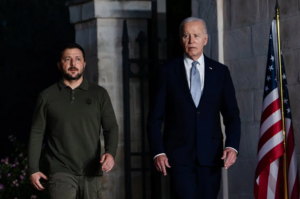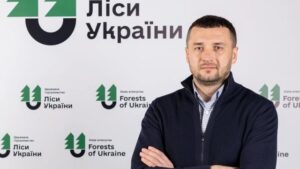
U.S. and European officials are struggling to honor their pledge to use Russian assets to aid Ukraine.
A long-awaited plan to help Ukraine rebuild using Russian money is in limbo as the United States and Europe struggle to agree on how to construct a $50 billion loan using Russia’s frozen central bank assets while complying with their own laws.
The fraught negotiations reflect the challenges facing the Group of 7 nations as they attempt to push their sanctions powers to new limits in an attempt to punish Russia and aid Ukraine.
American and European officials have been scrambling in recent weeks to try to get the loan in place by the end of the year. There is added urgency to finalize the package ahead of any potential shifts in the political landscape in the United States, where support for Ukraine could waver if former President Donald J. Trump wins the presidential election in November.
But technical obstacles associated with standing up such a loan have complicated matters.
Group of 7 officials grappled for months over how to use $300 billion in frozen Russian central bank assets to aid Ukraine. After European countries expressed reservations about the legality of outright seizing the assets, they agreed that it would be possible to back a $50 billion loan with the stream of interest that the assets earn.
The solution was intended to provide Ukraine with a large infusion of funds without providing more direct aid from the budgets of the United States and European countries. It also allowed western allies to make use of Russia’s assets without taking the step of actually spending its money, which many top officials in Europe believed would be illegal.
But differences in the legal systems in the United States and in Europe, which both plan to provide the money up front, have made it difficult to structure the loan.
The European Union, where most of Russia’s central bank assets are held, is required to renew the sanctions that have frozen Russia’s assets every six months.
Because of this E.U. law, the White House’s Office of Management and Budget has determined that there is a certain amount of risk associated with the loan and that, unless the E.U. changes its sanctions laws, Congress must approve additional funding for Ukraine to account for that risk. But securing additional funding for Ukraine is logistically and politically unlikely, leaving the loan in limbo.
“They thought a big, nice, shiny announcement would force the bureaucrats to find a way, and here we are three months later,” said Charles Lichfield, deputy director of The Atlantic Council’s GeoEconomics Center.
E.U. officials have been reluctant to change their sanctions laws to accommodate the United States because doing so requires the support of all 27 member nations. Europe could put forward the entire loan, and some officials there have suggested that it do so, but the United States believes that it is important for the Group of 7 to act in unison.
In recent days, European officials have been discussing the possibility of extending the sanctions review period to 12 or 36 months. While that would reduce the costs that the United States would incur in backing the loan, Congress would still most likely need to approve new money or redirect existing funds because of the risk that the sanctions might not be extended.
“Like U.S. officials, I’m disappointed that Europeans effectively took the summer off after making this commitment and only really started to address this topic this month,” said Philip Zelikow, a State Department official in both Bush administrations and a senior fellow at Stanford University’s Hoover Institution. “And some are creating new obstacles, for reasons that will not withstand much scrutiny.”
Mr. Zelikow, who has called for the United States to use the Kremlin’s assets to rebuild Ukraine, added, “Russia is counting on winning a war of attrition, including against Ukraine’s economy.”
The United States has provided about $175 billion in aid to Ukraine since Russia’s invasion began in early 2022. With the war showing no signs of abating, the International Monetary Fund expects Ukraine’s economy to slow in the second half of the year and for inflation to spike as attacks on its energy infrastructure persist.
The I.M.F. this month agreed to give Ukraine access to another $1.1 billion in financial assistance as part of a lending program that it approved last year.
A senior Biden administration official, who requested anonymity to speak about internal discussions, said that the United States needed assurances that codify the commitments of the Group of 7 leaders, who had agreed that Russia’s sovereign assets would remain immobilized until the war ends and until Russia repays Ukraine for the damage it had caused. Another senior U.S. official said that there was urgency to reach an agreement with Europe in the next few weeks and noted that the differences were more technical than ideological.
The loan has been difficult to devise because of a variety of risks associated with it. For instance, falling interest rates could diminish the value of the returns on the frozen Russian assets, most of which are held in Europe.
U.S. officials have looked into different scenarios for accounting for that risk. Although about $5 billion of Russian central bank assets are held in the United States, the Biden administration is not prepared to seize those funds to back the loan.
A spokeswoman for the Office of Management and Budget said that some of the funds that Congress had already allocated to support Ukraine could be used to cover potential costs associated with the loan. However, it is not clear if redirecting those funds for that purpose would require congressional approval.
The deliberations over the funds come as fighting between Ukraine and Russia is intensifying and as President Biden is on the verge of clearing the way for Ukraine to launch long-range Western weapons deep inside Russian territory.
The U.S. election in November is also weighing on the fate of Ukraine. At a presidential debate last week, Mr. Trump would not say if he wanted Ukraine to win the war and would only reiterate that he would work to swiftly end the fighting.
“It’s about getting it done before the election,” Mr. Lichfield said of the loan. “So the $50 billion is there to replace the U.S. if need be.”

In January-August 2024, JSC Ukrgasvydobuvannya and PJSC Ukrnafta increased commercial gas production by 7.7% (by 0.7 bcm) compared to the same period last year – up to 9.8 bcm.
These data were made public by Oleksiy Chernyshov, CEO of Naftogaz Group, at the European Business Association’s event Global Forecast. Strengthening Unity”.
Chernyshov also clarified that the group’s oil and condensate production during this period amounted to 1.3 million tons, compared to 1.2 million tons in January-August 2023. The plan for the year is 2 million tons, with 1.8 million tons in 2023.
According to him, Naftogaz is one of the largest investors in the country’s economy with an annual volume of investments and capital expenditures of about $2 billion.
Earlier, UGV reported an increase in commercial gas production by 7.2% to 9.26 billion cubic meters over 8 months of 2024.
As reported, Naftogaz’s consolidated quarterly report says that the group’s forecasted commercial gas production for 2024 is expected to reach 14.6 bcm. In February, Chernyshov said that the group’s goal for this year was to get closer to 15 billion cubic meters.

The State Enterprise “Forests of Ukraine” is asking to transfer self-seeded forests to state control in order to organize their fire protection, proper control and, if necessary, to quickly restore them, the CEO of the state enterprise Yuriy Bolokhovets said on Facebook. Bolokhovets reminded that the function of foresters is to detect and initially extinguish fires. However, only the State Emergency Service, which has a large number of powerful equipment, can cope with a large-scale natural disaster.
“In many cases, foresters begged the local authorities to transfer the forested areas to the state enterprise so that our farms could organize firefighting and proper control. But they were refused, and now we have the unfortunate consequences of irresponsibility. Self-seeded forests need to be urgently transferred under state control,” the Forests of Ukraine believe.
The state enterprise is currently considering the prospect of restoring the forest areas destroyed by fires. However, it runs into a procedure that takes a lot of time and money.
“The speed of restoration of burnt forests depends solely on the deregulation of the regulatory framework,” emphasized Bolokhovets.
The Forests of Ukraine intends to work on coordination and communication between units from different regions, increase the number of fire reservoirs, and establish cooperation with local authorities to create voluntary fire brigades.
“It is important that the conclusions are drawn not only by foresters,” urged the director general of the Forests of Ukraine.
As reported, in September 2024, record drought and lack of precipitation in a number of regions provoked large-scale forest fires. We are talking about a forest fire in Poltava region that covered almost 1000 hectares. A large fire in the Vyshedubechansky forestry on the area of 145 hectares has been localized near Kyiv. Significant fires in Kharkiv region in Zhovtnevyi and Chuhuiv-Vovchanskyi forestries have been stopped. The fire is no longer spreading, but the detonation of ammunition continues inside the forests.
According to the Forests of Ukraine, the situation has been stabilized thanks to the actions of foresters and units of the State Emergency Service of Ukraine. But for another week, foresters will have to fight large-scale forest fires.

In January-August 2024, Kokhavyno Paper Mill (KPM, Lviv region), which produces sanitary paper products, increased its production by 67.4% year-on-year to UAH 1 billion 279 million, according to statistics from UkrPapir Association.
As reported, in the first seven months of the year, the mill’s production growth was 61.1%, and in the first six months of the year it was 54.5% compared to the same period last year.
According to the association’s statistics provided to Interfax-Ukraine, the production of the base paper for sanitary products at the mill increased by 34.8% to 37.7 thousand tons over the eight months.
The production of toilet paper in rolls remained at the last year’s level – 90.4 million units. KPF confidently ranks second in terms of its output after Kyiv CPP.
As reported, in October last year, Kokhava Pulp and Paper Mill put into operation a paper machine for the production of cellulose base paper (previously, it produced only waste paper-based products). To organize such production in 2021, the mill attracted a EUR 13.8 million loan from the EBRD.
Kokhava Pulp and Paper Mill, which has been operating since 1939, produces base paper for sanitary and hygiene products, as well as toilet paper and paper towels. Before the new machine was put into operation, the mill had two pulp mills with a total capacity of 40 thousand tons of base paper per year.
In 2023, the plant increased its production by 18% compared to 2022 to UAH 1 billion 151.2 million, while net profit increased 2.7 times to UAH 137 million.

Poninkivska Cardboard and Paper Mill-Ukraine (PKPF-Ukraine, Khmelnytsky region), a major Ukrainian corrugated cardboard producer, increased its corrugated packaging output by 19% in January-August 2024 compared to the same period in 2023, to 63.64 million square meters.
According to statistics provided to Interfax-Ukraine by Ukrpapir Association, the mill continues to be one of the top three producers of corrugated packaging after Kyiv Cardboard and Paper Mill and Trypillia Packaging Plant.
Over eight months, the company also increased its production of containerboard (including corrugated paper) by 4.1% to 51.3 thousand tons, and produced more paper by 75% to 0.72 thousand tons.
In monetary terms, in January-August, PCBF-Ukraine produced products worth UAH 1 billion 742.5 million (+16.5%).
As reported with reference to the data collected by the association from the main enterprises of the industry, in January-August 2024, the production of paper and cardboard in Ukraine increased by 3% compared to the same period in 2023 – up to 390.5 thousand tons, cardboard boxes – by 17%, to 384.3 million square meters.
Poninkivska Paper Mill (formerly Poninkiv Cardboard and Paper Mill), once the largest producer of school notebooks, now has one main production line – paper and cardboard, producing mainly corrugated cardboard and corrugated packaging, as well as wrapping and waste paper.
The plant is part of the United Cardboard Company-Ukraine (UCC, Lutsk) owned by businessman Mykola Lobov, whose production assets include, among others, Lutsk KPF-Ukraine (Volyn region), which produced 41.4 thousand tons of various cardboard in eight months (according to Ukrpapir), almost the same as last year, and 31.8 million square meters of corrugated boxes, compared to 2.7 million square meters a year earlier.
As reported, in 2023, PCBF-Ukraine produced products worth almost UAH 2 billion 450 million, up 3% year-on-year. Net profit increased 2.7 times to UAH 27 million.